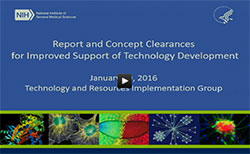NIGMS is considering how best to support two important activities: the development of biomedical technologies and access to those technologies as they become research resources. These topics are closely related, but there are aspects of each that should be explored independently.
Last summer, the Institute issued a request for information (RFI) on the support of biomedical technology development. The responses we received contributed significantly to initiatives for exploratory and focused technology development to be launched later this year. We now request your input in response to a new RFI on the need for and support of research resources (NOT-GM-16-103).
We’d like to know your thoughts on a number of topics, including:
- The appropriateness and usefulness of existing research resources to the biomedical research community.
- Examples of unmet needs for research resources.
- The relative value of resources that serve many investigators versus specialized resources used by fewer investigators.
- The value and manner of coupling technology development to research resources.
- The review of research resource applications and the evaluation of funded projects.
- The role of academia, other biomedical institutions and industry in developing and providing access to research resources.
- The role of investigators and user fees in supporting institutional, regional and national resources.
- The role of NIGMS in supporting research resources and technology development at various levels.
We also welcome any other comments that you feel are relevant to supporting research resources.
To respond to this RFI, send an email to nigmsresource@mail.nih.gov by June 3, 2016.
If you have any questions about the RFI, please let us know.



 I recently had the opportunity to talk to Phil Bourne, NIH’s associate director for data science, about some of the current Big Data to Knowledge (BD2K) initiative activities. I asked him how they tie together his vision of a digital enterprise for biomedical research and how they might benefit NIGMS grantees.
I recently had the opportunity to talk to Phil Bourne, NIH’s associate director for data science, about some of the current Big Data to Knowledge (BD2K) initiative activities. I asked him how they tie together his vision of a digital enterprise for biomedical research and how they might benefit NIGMS grantees.